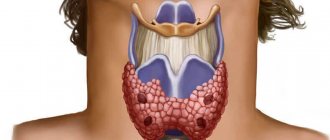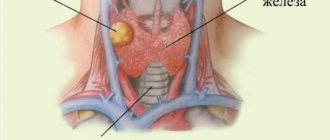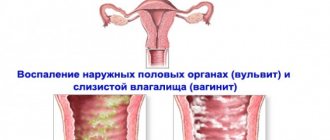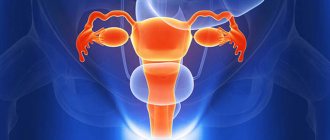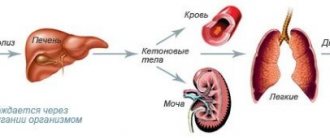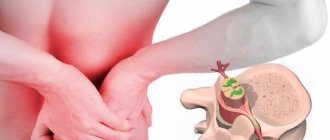Hypothyroidism in men is a consequence of pathological processes occurring in the thyroid gland. They can be triggered by hereditary anomalies (congenital hypothyroidism), or the gradual development of the disease, which initially has mild symptoms and appears gradually. Congenital hypothyroidism can lead, without timely treatment, to the development of mental retardation and irreversible loss of intelligence. The acquired form of the disease does not pose a significant threat to life if timely treatment is carried out. Lack of necessary therapy can lead to serious consequences, including the development of myxedematous coma. Knowing the symptoms of the disease and timely contacting an endocrinologist will allow you to avoid serious consequences and lead a normal life, replenishing the deficiency of hormones by taking special medications.
Test for hypothyroidism
Test yourself. This simple test will help you and your doctor rule out or suspect hypothyroidism. Answer “yes” or “no” to the statements below:
- Most of the time I feel tired and sleepy, I have no energy, I get tired quickly.
- My memory has deteriorated, I have difficulty concentrating, and I am slow to make decisions.
- I feel like my metabolism is slow: I have a low pulse, constipation, and my hair and nails are growing slowly.
- My skin is dry, flaky and pale, my hair is dry and falling out a lot, my nails are dull and brittle.
- I am constantly freezing, I cannot stand the cold, I feel cold even when those around me are warm.
- I am always in a depressed mood and have a lot of negative thoughts.
- My movements became sluggish, my reactions were slow.
- I have constant stiffness in my muscles and joints.
- I have high blood pressure and a low heart rate.
- My cholesterol/AST/ALT/LDH levels have increased.
- My weight is growing, despite dieting and exercise.
- I have infertility / irregular menstruation / decreased libido / decreased potency.
- I have a tendency to fluid retention and swelling.
- I have anemia, the cause of which cannot be determined.
If you answered “yes” 5 times or more, be sure to consult a doctor. It is possible that you have hypothyroidism . In preparation for the visit, it is advisable to take the following blood tests:
- TSH
- T4 free
- Anti-TPO (if they have not been studied previously).
Signs of the disease
The patient may independently suspect manifest hypothyroidism based on changes in his state of health, the symptoms of which should serve as an incentive to visit an endocrinologist. How the violation manifests itself:
- drowsiness, lethargy, decreased performance, decreased concentration;
- frequent headaches, decreased heart rate, decreased (less often increased) blood vessel tone;
- indigestion, atonic constipation (less commonly, diarrhea);
- chronic nasal congestion, swelling of the nasal mucosa;
- deepening of the voice, hoarseness;
- in some cases, the disease is accompanied by swelling of the face, feet and hands;
- low body temperature, sweating, muscle soreness;
- hair loss, thinning nail plates;
- in women – delayed or absent menstruation;
- in men – decreased potency or erectile dysfunction.
Thyroid hormones are involved in all metabolic processes; a lack of vital substances leads to:
- to disturbances in the functioning of the heart and blood vessels;
- to disruption of thermoregulation, sweating;
- to biliary dyskinesia, to decreased intestinal motility.
The manifest form of hypothyroidism can be:
- compensated, that is, the disease worsens periodically, and in general the body copes with the pathology;
- decompensated, the disease is stable and capable of progressing.
Primary manifest hypothyroidism without qualified medical care
leads in adults and children to myxedematous coma and death from heart failure, and in children, with early onset, to cretinism.
Why and who gets hypothyroidism?
Hypothyroidism is a deficiency of thyroid hormones. In this case, a syndrome develops (a complex of certain pathological symptoms), which doctors define as a single term “hypothyroidism”.
Annually per 1000 people 4 new cases of hypothyroidism are identified, i.e. we can say that hypothyroidism syndrome is a common phenomenon in the human population. Hypothyroidism is more common in women than in men.
Hypothyroidism is not a definitive diagnosis. This is a consequence, a result, which may have various causes (diseases, conditions).
Causes of hypothyroidism:
- absence or deficiency of active thyroid tissue (autoimmune thyroiditis, consequences of surgery or radioiodine treatment, congenital anomalies of the thyroid gland, consequences of non-autoimmune destructive thyroiditis, etc.);
- impaired synthesis of thyroid hormones (severe iodine deficiency, drug-induced damage to the thyroid gland, congenital defects in hormone synthesis);
- damage to the pituitary gland and/or hypothalamus , leading to disruption of the synthesis of thyrotropin-releasing hormone and TSH;
- t canal hypothyroidism (impaired cellular sensitivity to the effects of thyroid hormones, impaired transport of thyroid hormones, impaired conversion of T4 to T3, etc.).
If the cause of hypothyroidism is a non-functioning thyroid gland, we talk about primary hypothyroidism. If the cause is a violation of TSH production, then we call hypothyroidism secondary .
What hormones are needed by the thyroid gland?
To effectively deal with thyroid disorders, doctors need to know the causes of hypothyroidism and the factors that provoked the appearance of this disease in the patient. According to medical experts, one of the main causes of pathology is the inability of the thyroid gland to produce the hormones T3 and T4. This condition belongs to the primary category, because the cause of the insufficient amount of hormones necessary for the functioning of the thyroid gland is the thyroid gland itself. If a disorder occurs in the hypothalamic-pituitary system, the pathology is considered secondary.
According to medical experts, one of the main causes of pathology is the inability of the thyroid gland to produce the hormones T3 and T4.
Hypothyroidism can be congenital or acquired.
Pathology in humans can occur during prenatal development, and the child is born already having this disease. If the disease occurs later and develops over several years, the pathology is considered acquired.
The congenital form of the disease is characterized by one list of causes, while the acquired form is characterized by another. The time when the prerequisites for the formation of congenital pathology arise varies. Congenital disease occurs in the fetus:
- at 8-12 weeks of mother's pregnancy;
- after the formation of the child’s systems and before his birth.
The prerequisite for the occurrence of the congenital form of the disease is the disturbed structures of the thyroid gland, hypothalamus and pituitary gland. If the mother's body has antibodies to autoimmune diseases, there is a high probability that the baby will be diagnosed with hypothyroidism. Taking medications during pregnancy can lead to the most severe consequences, including the development of hypothyroidism in the fetus. The result may be similar when the fetus has an enzyme deficiency.
Pathology in humans can occur during prenatal development, and the child is born already having this disease.
In congenital hypothyroidism, the causes may be different. These may be infectious and fungal diseases suffered by the baby's mother during pregnancy. When a child is born prematurely, he is most often diagnosed with an immature thyroid gland, which becomes the cause of hypothyroidism.
How does autoimmune thyroiditis occur?
Hypothyroidism can have many causes, but the most common one is autoimmune thyroiditis (AIT) . With AIT, thyrocytes (thyroid cells that produce hormones) are destroyed. For hypothyroidism to develop, the majority of thyrocytes must die. At first, while a minority of cells have died, the gland continues to function normally. The fewer healthy thyrocytes remain, the more noticeably the production of hormones decreases. In response, according to the feedback principle, the pituitary gland increases TSH production, increasing stimulation of the thyroid gland.
Over time, due to hyperstimulation by high concentrations of TSH, the remaining thyroid cells continue to produce normal (low-normal) amounts of hormones. In the tests you can see an increased TSH and a normal T4 free. This situation is called subclinical hypothyroidism . There are no clear clinical manifestations of hypothyroidism at this stage yet.
As thyrocytes die, less and less levothyroxine is produced; TSH is getting higher and higher. Manifest hypothyroidism develops . In overt hypothyroidism, TSH is high and T4 is free. reduced. If hypothyroidism proceeds for a long time without treatment, then a severe clinical picture develops - myxedema: disruption of the functioning of all body systems due to the deficiency/absence of thyroid hormones. If treatment is not started in time, hypothyroid coma and death will develop.
Features of the disease in pregnant women
Another factor that often leads to a lack of thyroid hormones is pregnancy.
With congenital gland deficiency, a woman’s body cannot cope with the increased load.
Hypothyroidism manifest during pregnancy is easily detected during routine blood tests for hormones.
In order to promptly detect deviations from the norm, you need to undergo a preventive examination and donate blood within the prescribed period.
If the expectant mother does not know about her disorder, then decompensated hormone deficiency negatively affects the formation of the fetus.
Symptoms of hypothyroidism
Diagnosing hypothyroidism is both simple and difficult. Simply because the “key” to diagnosis is elevated TSH. (Let us remember the favorite saying of endocrinologists: “Examine TSH and sleep well.”) TSH research is accessible, cheap, and informative.
It is difficult because, unfortunately, the symptoms do not always cause doctors to suspect hypothyroidism. After all, people with hypothyroidism rarely consult an endocrinologist. The symptoms that bother them are usually a reason to go to a cardiologist, dermatologist, gynecologist, hematologist, otolaryngologist, neurologist... Anyone, but not an endocrinologist.
Hypothyroidism is a great master of camouflage. He has many masks, and under these masks, only a blood test for TSH will help to consider a single cause - a deficiency of thyroid hormones.
If hypothyroidism is suspected, it is enough to take a blood test for TSH, and within 2 hours the diagnosis of hypothyroidism will be confirmed or refuted.
The fact is that with hypothyroidism syndrome, all organs and systems suffer. None of the symptoms of hypothyroidism are specific to this disease. Exactly the same symptoms can occur in various diseases of the cardiovascular, respiratory, and digestive systems; can be observed in neurological, hematological, dermatological, rheumatological, psychiatric, gynecological practice.
Sometimes patients with hypothyroidism go from doctor to doctor for years, receiving useless prescriptions, suffering from increasing symptoms of the disease, without receiving the only necessary treatment - thyroxine replacement therapy.
Why does the manifest form of the disease develop?
Let's consider the main reasons for the development of the manifest form of hypothyroidism:
- An acute lack of iodine leads to the disease, especially when it is combined with an excess of calcium and lithium in the body. After all, iodine is necessary for the synthesis of thyroid hormones. It should be noted that against the background of moderate iodine deficiency, it is manifest hypothyroidism that develops.
- Some patients with chronic inflammation of the thyroid tissue develop hypofunction over time. If we use medical terminology, the disease autoimmune thyroiditis turns into the disease hypothyroidism.
- Performing surgery to remove part or all of the thyroid gland.
- Taking large doses of thyreostatics - medications prescribed to patients with thyrotoxicosis. Their action is aimed at capturing iodine to reduce the hormonal activity of the gland. Thus, hyperthyroidism turns into hypothyroidism.
- A consequence of radiation damage to the thyroid gland or a targeted course of treatment of the organ with radioactive iodine.
- Congenital abnormalities of the thyroid gland - there may be an insufficient number of cells producing hormones, or they may be absent altogether. The patient's process of synthesis of thyroid hormones was disrupted from birth. Such patients make up no more than 1% of all patients with hypothyroidism.
- Genetic predisposition to the disease. Children whose parents have hypothyroidism are more likely to be diagnosed with the disease as they get older.
In addition, hormonal imbalances often cause the development of manifest hypothyroidism. In women, such disruptions occur during puberty, pregnancy, recovery time after childbirth, and menopause. Only an endocrinologist can make a final diagnosis.
Approaches to treating the disease
The main treatment for a diagnosis of manifest hypothyroidism is hormone replacement therapy with synthetic thyroxine analogues. The following medications are prescribed: Eutirox, Thyrotom, L-thyroxine.
The dose of the drug and duration of therapy are prescribed to each patient by the endocrinologist individually. They depend on the amount of thyroid hormones in the human body, his age and the cause of the pathology.
When a patient has autoimmune thyroiditis in a complex form, a fragment of the thyroid gland or the entire organ will have to be removed. Rehabilitation after surgery involves taking hormonal medications. If part of the thyroid gland has been removed, you will have to take hormones for the rest of your life.
Folk remedies for manifest gland dysfunction can only be considered as an additional treatment and only after agreement with the attending physician. In some conditions the patient will need to treat complications of the disease:
- for constipation, an effective laxative is prescribed;
- in order to improve the functioning of the digestive system, enzymes are prescribed;
- select heart rate stabilizers when problems with the heart appear;
- special ointments are used to remove mucous swelling;
- restore dry and brittle hair, as well as thin nails using special products.
It is important to follow all recommendations of your treating doctor.
In order for the treatment to give maximum effect, the patient must adhere to a special diet. Its basic rules:
- a minimum of animal fats;
- consuming the maximum amount of fiber found in vegetables and fruits;
- regular consumption of foods containing selenium and iodine;
- reducing the amount of salt in your diet.
When swelling of the limbs appears, it is necessary to strictly monitor the amount of fluid consumed per day. Its volume should not exceed 1.5 liters per day. For severe swelling, the doctor can reduce the amount of fluid to 600 ml per day. You should not make such decisions on your own.
Diagnosis of the manifest form of hypothyroidism
Diagnosis of manifest hypothyroidism involves the following studies:
- Analysis of venous blood for hormones.
- Blood test for the presence of antibodies to TSH.
- Ultrasound of the thyroid gland. To identify the process of changes in the functioning of other organs in the body, an ultrasound of the abdominal cavity is performed.
- A general blood test can reveal anemia - a low level of hemoglobin in the red blood cell.
- General urine analysis.
In this form of the disease, the level of TSH in the blood is significantly increased, and T4 is decreased.

